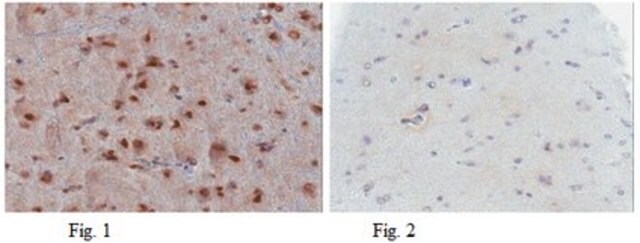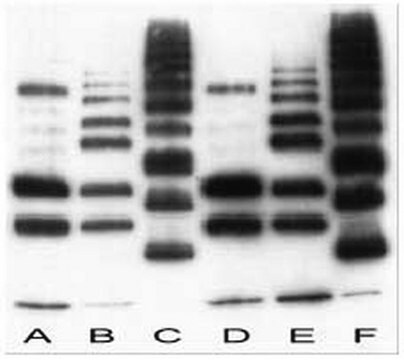OP29
Anti-p53 (Ab-3) (Mutant) Mouse mAb (PAb240)
liquid, clone PAb240, Calbiochem®
Sinonimo/i:
Mutant p53 Antibody
About This Item
Prodotti consigliati
Origine biologica
mouse
Livello qualitativo
Forma dell’anticorpo
purified antibody
Tipo di anticorpo
primary antibodies
Clone
PAb240, monoclonal
Stato
liquid
contiene
≤0.1% sodium azide as preservative
Reattività contro le specie
mouse, rat, human, chicken, hamster, bovine
Non deve reagire con
Xenopus
Produttore/marchio commerciale
Calbiochem®
Condizioni di stoccaggio
do not freeze
Isotipo
IgG1
Condizioni di spedizione
wet ice
Temperatura di conservazione
2-8°C
modifica post-traduzionali bersaglio
unmodified
Informazioni sul gene
human ... TP53(7157)
Descrizione generale
Immunogeno
Applicazioni
Frozen Sections (10 µg/ml)
Gel Shift (see comments)
Immunoblotting (5 µg/ml)
Immunofluorescence (1-20 µg/ml, see application references)
Immunoprecipitation (1 µg per sample)
Paraffin Sections (see application references)
Confezionamento
Attenzione
Stato fisico
Risultati analitici
SK-OV-3 cells
A431, Hs27 (wild-type p53), or SK-BR-3 cells or breast carcinoma tissue
Altre note
Greenblatt, M.S., et al. 1994. Cancer Res.54, 4855.
Barak, Y., et al. 1993. EMBO J.12, 461.
Kastan, M.B., et al. 1992. Cell71, 587.
Kuerbitz, S.J. 1992. Proc. Natl. Acad. Sci. USA89, 7491.
Lane, D.P. 1992. Nature358, 15.
Kastan, M.B., et al. 1991. Cancer Res.51, 6304.
Note legali
Non trovi il prodotto giusto?
Prova il nostro Motore di ricerca dei prodotti.
Codice della classe di stoccaggio
10 - Combustible liquids
Classe di pericolosità dell'acqua (WGK)
nwg
Punto d’infiammabilità (°F)
Not applicable
Punto d’infiammabilità (°C)
Not applicable
Certificati d'analisi (COA)
Cerca il Certificati d'analisi (COA) digitando il numero di lotto/batch corrispondente. I numeri di lotto o di batch sono stampati sull'etichetta dei prodotti dopo la parola ‘Lotto’ o ‘Batch’.
Possiedi già questo prodotto?
I documenti relativi ai prodotti acquistati recentemente sono disponibili nell’Archivio dei documenti.
Il team dei nostri ricercatori vanta grande esperienza in tutte le aree della ricerca quali Life Science, scienza dei materiali, sintesi chimica, cromatografia, discipline analitiche, ecc..
Contatta l'Assistenza Tecnica.








